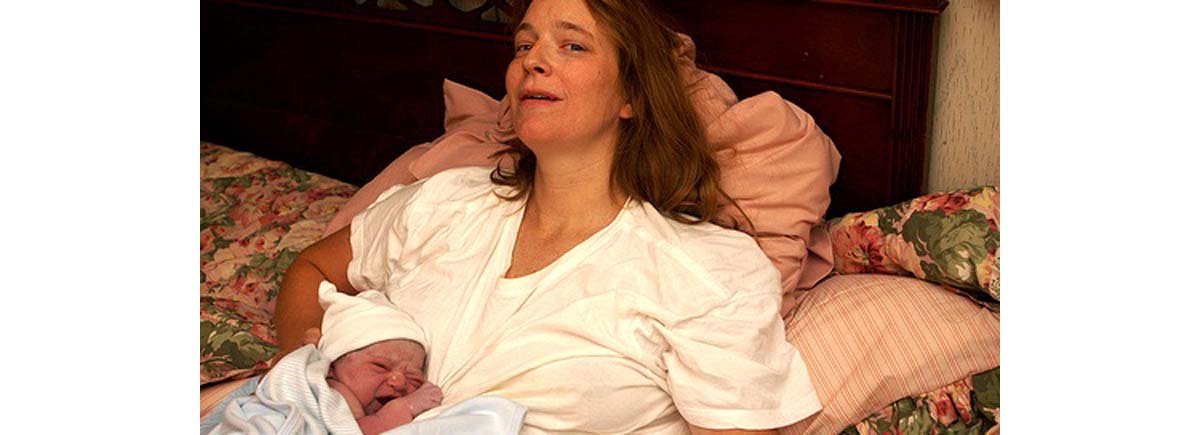Table of Contents
Water As Pain Relief During Labor and Birth
Water birth is, basically, exactly what it sounds like. Increasing numbers of women are choosing to give birth while they are immersed in water in a dedicated birth tub, or at least to make their way through their labors in the water. These tubs are available in many hospitals and birth centers now, and they can also be bought for personal use at a homebirth.

Sometimes, a homebirth midwife will supply a birth tub to women who are interested in giving birth or laboring in the water.
Water birth advocates list many benefits of the practice. Pain relief for the laboring mother is one of the primary benefits of water birth. Others include more freedom of movement due to the water's buoyancy, support to the perineum and thus a lower chance of tearing, and a gentle entrance into the world for the baby.
It is important to point out that most of the reasons water birth advocates say this practice is amazing have no basis in science (yet?). Still, comfortably warm water certainly does provide a significant level of pain relief. You don't need to go through lots of documents on Google Scholar to find evidence of this; any woman who has ever taken a warm shower to combat menstrual cramps can attest to this fact. Any laboring woman simply needs to try what the pain is like while immersed in her own bathtub or a birth tub, and compare that to the sensations she has while she labors on dry land. I have tried it, and water most certainly did the trick for me.
Some doctors and mothers-to-be are concerned about the risk of infection associated with a water birth. It is not currently clear what how big that risk is, but there is good reason to believe that potential risk does exist. Birth tubs used in hospitals, birth centers, or by midwives for multiple mothers are dreadfully risky if they are not cleaned and disinfected properly. The laboring mother herself may contaminate the tub during labor too (I'm sure you know what I am referring to, so I don't have to spell it out!).
You can still have the benefits of pain relief from water if you don't fell comfortable with a full water birth. In that case, get out of the tub as soon as your bag of waters ruptures. Those women who do not have access to a birth pool can still labor in their bathtub at home or in hospital (if provided), or take a warm shower during labor.
Hypnobirthing
Hypnobirthing is another relatively popular natural pain relief option among women who want an unmedicated birth. Though hard to explain simply, hypnobirthing programs involve relaxation techniques, positive affirmations, and self-hypnosis. There are various hypnobirthing programs on the market, but Hypnobabies is the most well known of them.
Hypnobabies can be studied at home with audio CDs, or in a group led by a Hypnobabies instructor. Participants practice the techniques associated with hyponbirthing throughout their pregnancy, both to gain instant peace and relaxation and in preparation for the labor and birth.
Positive affirmations and visualizations are a large part of Hypnobabies — pregnant women spend time imaging their ideal birth in great detail. They may listen to sentences like “my cervix will open smoothly”. Terminology that is perceived as negative is avoided. “Contractions” become “surges”, for instance.
Does hypnobirthing work? If you are a natural skeptic, that is very hard to believe. Having watched numerous videos of women employing hypnobirthing techniques, often in a homebirth setting where water birth is also chosen, it was quite amazing to notice that these mothers are exceptionally calm and appear to be having a painless birth.
One mother who used Hypnobabies during her pregnancy and then her hospital birth told me that Hypnobirthing did not, in fact, take all of the pain of labor away. It did, she said, shut out all of the outside influences going on around her, enabling her to have a much more peaceful birth. This, too, can matter. Think of hypnobirthing as a form of meditation. If it doesn't take the pain away, it can at least help you cope. If you let the vibes in.
- Photo courtesy of bbaltimore on Flickr: www.flickr.com/photos/bbaltimore/43117373
- Photo courtesy of yarashus on Flickr: www.flickr.com/photos/yarashus/2776775099/
- Photo courtesy of theogeo on Flickr: www.flickr.com/photos/theogeo/6323920416

